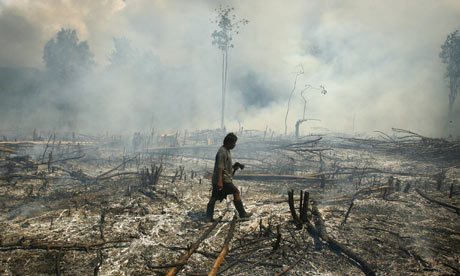Bid by rich countries to change forestry rules would create accounting loopholes that would hide true emissions, developing nations say
John Vidal Tuesday 8 June 2010 15.44 BST

Tojo, Indonesia: A villager walks through a burnt forest. Forest management is key to climate talks because it is the biggest source of carbon credits and the biggest potential source of mitigation. Photograph: Yusuf Ahmad/Reuters
Rich countries led by Russia, Australia and the EU have been accused of trying to cheat their way out of reducing their greenhouse gas emissions by creating "dishonest" forestry accounting loopholes.
By seeking to change the rules that govern the offsetting of emissions from planting trees and ignoring those that are created by felling them, these nations would give the impression that they were acting to prevent climate change – but a growing number of developing countries and environmental groups say that in reality they would be undermining genuine cuts.
The row surfaced at the resumption of the UN climate negotiations in Bonn this week, but today became a major point of contention between rich and poor nations. Diplomats from the G77, the Africa group of countries, Pacific islands like Tuvalu and the coalition of rainforest countries all demanded that the rich nations (so-called Annex 1 nations) make absolute reductions in emissions.
According to the Climate Action Network (CAN), a coalition of more than 500 environment and development groups around the world, the revision of the land use, land use change and forestry (LULUCF) rules would falsely exaggerate emission reductions.
"It's a disgraceful scandal. It would be disastrous for the climate," said Sean Cadman, a spokesman for CAN. "This is a massive loophole. All rich countries except Switzerland are now trying to avoid the consequences of increasing the harvesting of forestry. They want LULUCF to drive ambition [to reduce emissions] down. But it will increase the gap between the cuts pledged and those that are needed."
CAN and developing countries calculate that loopholes could account for nearly 400m tonnes of CO2, or nearly 5% of the global total. Russia, which wants to massively increase its forestry to pre-Soviet collapse levels, stands to avoid making nearly 200m tonnes of cuts.
Yesterday it emerged that Annex 1 countries will only adopt the high end of their targets if they can get the emissions loopholes that they are seeking.
Russia said that without new forestry accounting methods it would only be able to cut overall emissions by 15%, as opposed to the 30% conditional pledge it made at Copenhagen.
Forest management is seen as key to the climate talks because it is the biggest source of carbon credits and the biggest potential source of mitigation. Developing countries fear that if the rich countries succeed in changing the LULUCF baseline rules, there will be less international demand for carbon credits, which would reduce their potential income from a climate deal.
"This is fraudulent accounting," said Melanie Coath, climate change officer at RSPB. "We are seeing a shocking race to the bottom. The forests of Europe could be an important part of the solution to climate change. Instead we are seeing them being used to undermine the integrity of a global climate deal."
Friends of the Earth's international climate campaigner, Asad Rehman, said: "When it comes to forests rich countries can't see the wood for the trees - they're doing everything to get out of cutting their emissions first and fastest and putting the climate negotiations in danger."
![]()
http://www.guardian.co.uk/environment/2010/jun/08/forest-emissions-bonn-climate-talks